49th Session of the Human Rights Council
28 February - 1st April 2022
ITEM 3: Interactive Dialogue with the Special Representative on Children in Armed Conflict
16 March 2022
By Tiril Andresen and Isabelle Despicht / GICJ
Executive Summary
On the 15th and 16th of March, the Human Rights Council held an Interactive Dialogue with the Special Representative of the Secretary-General for Children and Armed Conflict, Virginia Gamba. The discussion addressed the issues presented in the report on Children and Armed Conflict, submitted by the Special Representative on the 4th of January, covering the period from December 2020 to December 2021.
In her opening remarks, the Special Representative emphasised the urgent need to protect children in conflict zones against grave human rights violations. According to the report, the first nine months of the reporting period were marked by a sustained number of violations, including killings, maimings and the recruitment of children, and denial of humanitarian aid. During this period, we also witnessed an increase in cases of child abductions, with especially alarming numbers in Somalia, DRC, and the Lake Chad Basin. In addition, the Covid 19 pandemic increased children's vulnerabilities, posing new and extreme challenges to their wellbeing.
During the interactive dialogue, state delegates and NGOs provided suggestions on ending and preventing the unprecedented challenges children living in conflict zones face today. The European Union first took to the floor, addressing the unbearable suffering the children of Ukraine are facing as Russia attacks schools, homes, orphanages, and medical facilities. The Nordic-Baltic countries and UN Women, emphasised that girls’ right to education is undermined during armed conflict, exposing them to the risk of sexual and gender-based violence. Other states, including Uruguay and France, underscored that the Covid-19 pandemic worsened the situation of children, especially those victims of armed conflict. The Swiss delegate addressed the mandate and asked how the Council could ensure that the difficulties faced during the pandemic will not be repeated.
Geneva International Centre for Justice (GICJ) is deeply concerned about the threats children in armed conflict face, including sexual and gender-based violence and enforced disappearance. Children's rights should be protected, especially in armed conflict. We emphasise that the mandate's goal will not be achieved until all violence against children in armed conflict ceases to exist. Therefore, we call on states to redouble their efforts to work to prevent conflicts. The international community must work together to ensure the safety and wellbeing of children and sanction the perpetrators responsible for human rights violations.
Background
2022 marked the twenty-fifth anniversary of the creation of the mandate of the Special Representative to the Secretary-General on Children and Armed conflict. 2022 also marked 20 years since the entry into force of the optional protocol to the convention of the right of the child on the involvement of children in armed conflict, and 15 years since the adoption of the Paris Principles and Guidelines on Children Associated with Armed Forces or Armed Groups. Since the establishment of the mandate, the Secretary-General has worked closely with UN partners, member states and regional organisations, leading to significant progress in the mission to protect and prevent violations against children in armed conflict.
The mandate for the Special Representative for Children and Armed Conflict, which was created in 1996, has been extended on multiple occasions. The most recent resolution (A/RES/72/245), renewing the mandate was signed on December 24, 2017.
Report of the Special Representative of the Secretary-General for Children and Armed Conflict
On the 4th of January 2022, the Special Representative to the Secretary-General for Children in Armed Conflict, Virginia Gamba, submitted her report on Children and Armed Conflict, covering the period from December 2020 to December 2021. Ms Gamba submitted her report under GA Resolution 74/133, which effectively mandated the SRSG for Children in Armed Conflict to submit a report to the Human Rights Council on activities undertaken. Apart from presenting the activities undertaken, the Special Representative also submitted information on the collaboration with relevant actors, such as states, UN bodies and agencies, regional and subregional organisations. She further noted the progress and challenges in ending and preventing grave violations.
Progress and challenges in ending and preventing grave violations
In her report, the Special Representative to the Secretary-General (SRSG) reported on the unprecedented challenges for children living in conflict zones. She emphasised that a sustained high number of violations marked the first nine months covered by the report. During this period, the killing and maiming of children represented the most verified violation, followed by the recruitment and use of children in armed conflict, and the denial of humanitarian aid. Ms Gamba also addressed an increase in cases of child abductions, with especially alarming numbers in Somalia, DRC, and the Lake Chad Basin.
Furthermore, the report underlined that the Covid 19 pandemic further exacerbated the challenges faced by children living in conflict. The pandemic increased children's vulnerabilities and posed new and extreme challenges to their well-being. The Special Representative also addressed the precarious situation for children in the Islamic Republic of Afghanistan following the control of Kabul by the Taliban in August 2021. She enumerated that the UN opened a dialogue in the Central African Republic, aiming to discuss concerns about the protection of children in armed conflict and the use of schools by military armed groups in the country. The participants, among others, included the ministers responsible for primary and secondary education and the advisory minister. Ms Gamba too underlined UN efforts in Colombia, where UN bodies engaged with various parties to discuss plans to prevent violence against children. Child recruitment remains a significant issue in the country.
The report also addressed current issues in the Democratic Republic of Congo. The Rapporteur elaborated on accountability issues and the sentencing of several armed forces elements for crimes against children. As for Iraq, the SRSG laid out the current situation on the Yadizi Women Survivors Law for rehabilitation and reparation for the crimes committed by Daesh. The report, however, underlined that the law seeking reparations does not cover male survivors of rape.
The report further elaborated on progress and efforts made in various other countries, notably Myanmar, Nigeria, Somalia, South Sudan, the Syrian Arab Republic and Yemen.
Raising Awareness, mobilising global action and building partnerships
An essential part of the SRSGs work on raising awareness about the current challenges children in conflict zones face today was engaging the media and giving accurate information. Between December 2020 and December 2021, the Special Representative published 40 press releases and public statements to call for the protection of children affected by armed conflict. The Special Representative was also an active participant in high-level events, including video conferences, exhibitions, and virtual events.
The Office further focused on the ongoing campaign called "Act to Protect Children Affected by Armed Conflict" to spread awareness globally. The campaign was spread on social media by the hashtag #ACTtoProtect.
As a way of making sure that the voices of conflict-affected children are being heard, the work of the Special Representative focused on sharing stories from the children affected by war. Their stories are included in the most recent report by the Office. In November 2021, the Special Representative organised a digital meeting to discuss the Safe Schools Declaration directly with children, where they presented the Children's manifesto "We do not want to be scared any longer". The manifesto was later published on the Office's website and shared with the Member States in December 2021.
Recommendations
After expressing profound concern about the scale and severity of the violations committed against children, the Special Representative shared her recommendations with UN Member States. In her final remarks, she called upon relevant parties to comply with their obligations under international law. In her recommendations, she also underlined the need to take effective and appropriate steps to facilitate the protection and safety of children with disabilities in armed conflict. She reminded the Member States that the sustainable reintegration of children is crucial to ensuring sustainable peace and security and breaking cycles of violence.
Interactive Dialogue
Statement of the High Commissioner for Human Rights
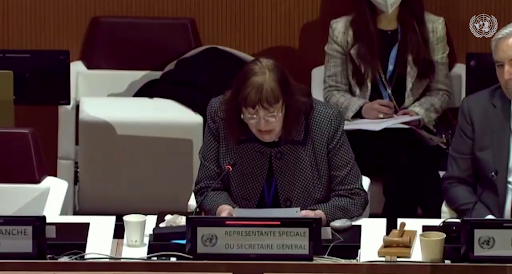 On the 15th and 16th of March, the Human Rights Council held an Interactive Dialogue with the Secretary-General's Special Representative for Children and Armed Conflict, Virginia Gamba. Ms Gamba started the dialogue by noting that, since establishing the mandate, the Secretary-General has worked closely with UN partners, member states, and regional organisations, leading to significant progress in the mission to protect and prevent violations against children in armed conflict.
On the 15th and 16th of March, the Human Rights Council held an Interactive Dialogue with the Secretary-General's Special Representative for Children and Armed Conflict, Virginia Gamba. Ms Gamba started the dialogue by noting that, since establishing the mandate, the Secretary-General has worked closely with UN partners, member states, and regional organisations, leading to significant progress in the mission to protect and prevent violations against children in armed conflict.
However, the report on Children and Armed Conflict, published in January 2022, emphasises that the mission to protect children living in conflict zones remains as urgent as ever. The Special Representative expressed deep concern about the high number of grave violations against children in conflict zones in 2021. The killing and maiming of children remains the highest verified violation, followed by the recruitment and use of children in armed conflict, and the denial of humanitarian access. In addition, the report reveals an increase in attacks on schools and hospitals, sexual violence and child abduction, not to mention the Covid-19 pandemic which increased children's vulnerabilities and hampered the monitoring and verification of grave violations and engagement with parties to the conflict.
After the opening remarks, the interactive dialogue commenced with statements and questions from several delegations.
Interactive dialogue
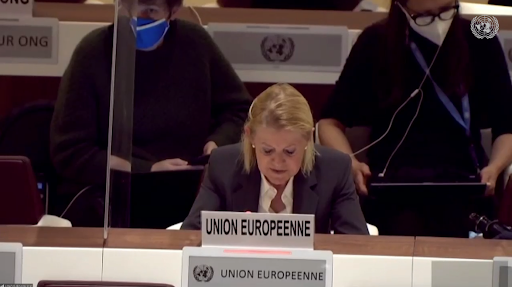 The representative of the European Union started by addressing the unbearable suffering and trauma the children in Ukraine are facing, as schools, medication facilities, and civilian supply lines are being targeted. The EU strongly condemned the Russian attacks against children's hospitals and maternity wards in Mariupol and called for an immediate end to indiscriminate attacks on civilians and civilian infrastructure.
The representative of the European Union started by addressing the unbearable suffering and trauma the children in Ukraine are facing, as schools, medication facilities, and civilian supply lines are being targeted. The EU strongly condemned the Russian attacks against children's hospitals and maternity wards in Mariupol and called for an immediate end to indiscriminate attacks on civilians and civilian infrastructure.
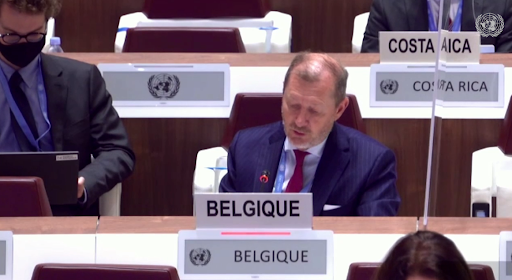 On behalf of the Nordic-Baltic countries, Estonia expressed deep concern about the risk of threats children in armed conflict are facing, including sexual and gender-based violence and disappearance. Belgium addressed how the right to education for girls is further undermined in the situation of armed conflict, which exposes them to the risk of gender-based violence, including sexual violence. Belgium then addressed the Special Representative, asking for her suggestions on the best way to get non-state armed groups to respect the right to education during armed conflict.
On behalf of the Nordic-Baltic countries, Estonia expressed deep concern about the risk of threats children in armed conflict are facing, including sexual and gender-based violence and disappearance. Belgium addressed how the right to education for girls is further undermined in the situation of armed conflict, which exposes them to the risk of gender-based violence, including sexual violence. Belgium then addressed the Special Representative, asking for her suggestions on the best way to get non-state armed groups to respect the right to education during armed conflict.
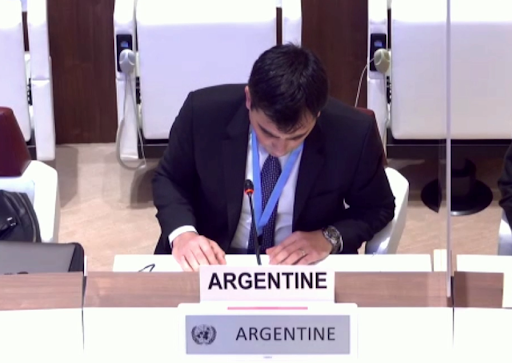 On behalf of a group of states, Argentina emphasised the importance of protecting education from attacks during armed conflict. The delegate of Argentina welcomed Tunisia as the last endorsing state to the Safe School Declaration (SSD), and urged other states to endorse the declaration and its guidelines. Lastly, the states welcomed the adoption in 2021 of the first stand-alone security council resolution (2601) on the protection of education in conflict.
On behalf of a group of states, Argentina emphasised the importance of protecting education from attacks during armed conflict. The delegate of Argentina welcomed Tunisia as the last endorsing state to the Safe School Declaration (SSD), and urged other states to endorse the declaration and its guidelines. Lastly, the states welcomed the adoption in 2021 of the first stand-alone security council resolution (2601) on the protection of education in conflict.
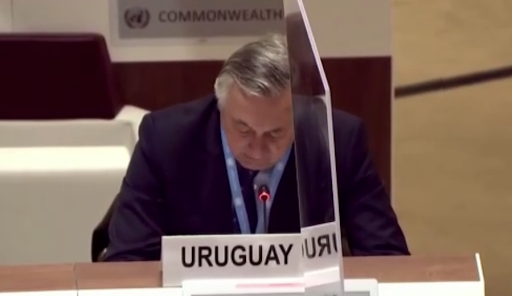 On behalf of 27 states, Uruguay expressed deep concern about the challenges affecting children in armed conflicts that arose in 2021, especially due to the covid-19 pandemic. The delegate emphasised that the goal of the mandate is not reached until all violence against children in armed conflict is brought to an end. Lastly, the delegate of Uruguay addressed the Special Representative, asking how human rights mechanisms can contribute towards ending violence against children in armed conflict.
On behalf of 27 states, Uruguay expressed deep concern about the challenges affecting children in armed conflicts that arose in 2021, especially due to the covid-19 pandemic. The delegate emphasised that the goal of the mandate is not reached until all violence against children in armed conflict is brought to an end. Lastly, the delegate of Uruguay addressed the Special Representative, asking how human rights mechanisms can contribute towards ending violence against children in armed conflict.
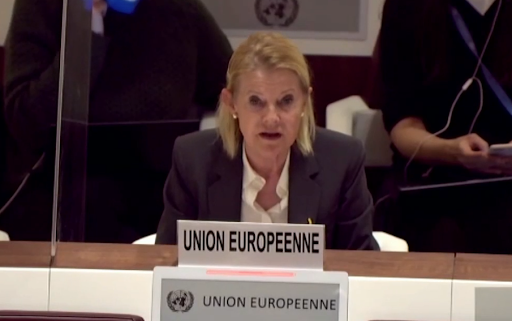 The European Union then took to the floor again, focusing on the humanitarian crisis in Ukraine. It is estimated that 30 percent of the country's population is in dire need of life-saving humanitarian assistance, many of them children. The EU strongly condemned the Russian attacks against children's hospitals and maternity wards in Mariupol and underlined that attacks on schools, homes, orphanages and medical facilities are unacceptable. Finally, the European Union called for an immediate end to indiscriminate attacks on civilians and civilian infrastructure. It is currently snowing in Ukraine, with temperatures reaching below zero. Children urgently need help and protection, especially in supplies, critical support, and access to essential social services. The representative turned to the Special Rapporteur and asked: ‘’In your view, what are the primary needs for children affected by the conflict in Ukraine?‘’. In the ensuing discussion, delegations and civil society organisations emphasised the grave human rights violations children living in conflict zones face, including recruitment, killing and denial of humanitarian assistance.
The European Union then took to the floor again, focusing on the humanitarian crisis in Ukraine. It is estimated that 30 percent of the country's population is in dire need of life-saving humanitarian assistance, many of them children. The EU strongly condemned the Russian attacks against children's hospitals and maternity wards in Mariupol and underlined that attacks on schools, homes, orphanages and medical facilities are unacceptable. Finally, the European Union called for an immediate end to indiscriminate attacks on civilians and civilian infrastructure. It is currently snowing in Ukraine, with temperatures reaching below zero. Children urgently need help and protection, especially in supplies, critical support, and access to essential social services. The representative turned to the Special Rapporteur and asked: ‘’In your view, what are the primary needs for children affected by the conflict in Ukraine?‘’. In the ensuing discussion, delegations and civil society organisations emphasised the grave human rights violations children living in conflict zones face, including recruitment, killing and denial of humanitarian assistance.
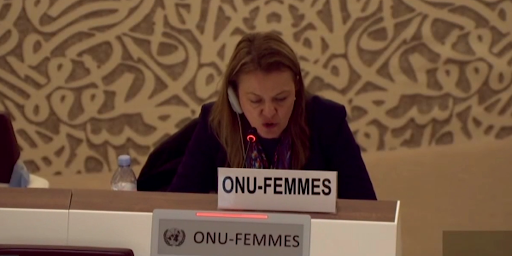 UN Women addressed how children, particularly girls, are disproportionally impacted during conflicts, exposing them to increased risk of sexual and gender-based violence, including harmful practices such as child marriage. The challenges primarily address those who are refugees or internally displaced. The speaker highlighted the importance of respecting human rights and international humanitarian law. Delegations especially stressed the need to ensure the right to education and called on all states to ensure the implementation of the Safe Schools Declarations (SSD).
UN Women addressed how children, particularly girls, are disproportionally impacted during conflicts, exposing them to increased risk of sexual and gender-based violence, including harmful practices such as child marriage. The challenges primarily address those who are refugees or internally displaced. The speaker highlighted the importance of respecting human rights and international humanitarian law. Delegations especially stressed the need to ensure the right to education and called on all states to ensure the implementation of the Safe Schools Declarations (SSD).
In her concluding remarks, the Special Representative reported that monitors and networks of child protection had been reinforced to strengthen the protection of children in armed conflict. Ms Gamba also stressed the importance of the national implementation of the Convention on the Rights of the Child.
On the 16th of March 2022, the Interactive Dialogue with the Special Representative to the Secretary-General on Children in Armed Conflict continued during the 31st meeting of the UN Human Rights Council regular session.
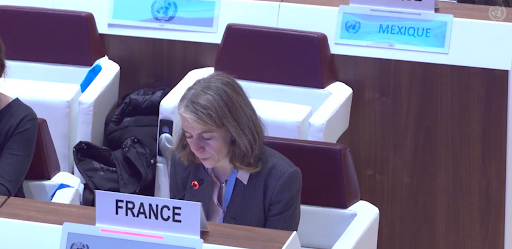 The French delegate, Ms Emmanuelle Lachaussée, underscored that the Covid-19 crisis only worsened the situation of children, especially those victims of armed conflict. As education is put on hold in times of hostilities, children face an increased risk of being recruited. She went on to say that the Covid-19 pandemic also affected the identification of those responsible for violating children’s rights and that the event complicated the discussions with conflict parties. Given necessary action, the representative stressed France’s continuous action to remedy the plight of children in armed conflict by honouring the 15th anniversary of the Paris Principles and Commitments on freeing Children from War that France developed in partnership with UNICEF. To this day, 112 states approved the principles, and France welcomes the recent signatures of Jordan and Mongolia. Furthermore, Ms Lachaussée accentuated France’s contributions to the Fund for victims of sexual violence in armed conflict, allowing children victims of such violations to seek reparations, which are essential to allow their reinsertion into society. The delegate noted the difficulty of the parties in the conflict to communicate well during times of pandemic. She asked, ‘’What can be done to remedy this situation?’’.
The French delegate, Ms Emmanuelle Lachaussée, underscored that the Covid-19 crisis only worsened the situation of children, especially those victims of armed conflict. As education is put on hold in times of hostilities, children face an increased risk of being recruited. She went on to say that the Covid-19 pandemic also affected the identification of those responsible for violating children’s rights and that the event complicated the discussions with conflict parties. Given necessary action, the representative stressed France’s continuous action to remedy the plight of children in armed conflict by honouring the 15th anniversary of the Paris Principles and Commitments on freeing Children from War that France developed in partnership with UNICEF. To this day, 112 states approved the principles, and France welcomes the recent signatures of Jordan and Mongolia. Furthermore, Ms Lachaussée accentuated France’s contributions to the Fund for victims of sexual violence in armed conflict, allowing children victims of such violations to seek reparations, which are essential to allow their reinsertion into society. The delegate noted the difficulty of the parties in the conflict to communicate well during times of pandemic. She asked, ‘’What can be done to remedy this situation?’’.
Japan, represented by Mr Yoshiyuki Yamada, thanked the Special Representative to the Secretary-General for her report and expressed Japan’s strong support for the work of her Office. In his statement, the delegate called for an immediate cessation of the hostilities in Ukraine. It is regrettable that children in armed conflict suffer despite the efforts made by the international community to protect them. As the world is currently witnessing the plight of children in Ukraine, Japan urged all countries to fully comply with their obligations under International Human Rights Law and Humanitarian Law and implement all Security Council Resolutions on Children in Armed conflict. In continuation, Japan called the Special Representative to the Secretary-General to work closely with all relevant stakeholders and human rights institutions including the Committee on the Rights of the Child to ensure the protection and care of children affected by armed conflict.
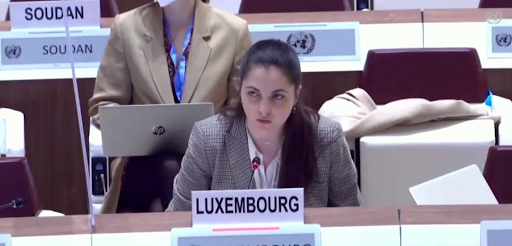 Ms Levina Gordet, on behalf of Luxembourg, expressed her delegation’s complete alignment with the Statement of the European Union. Luxembourg welcomed the work of the Special Representative and the significant progress achieved since the creation of the mandate. However, the delegate noted that Luxembourg remains deeply concerned over the high number of violations of children’s rights in armed conflict committed by state and non-state actors. In a direct question to the Special Representative, she asked how Luxembourg and other countries can contribute to finding creative solutions to facilitate UN collaboration with parties to the conflict. Furthermore, the representative urged that children suffering from the war in Ukraine should be a priority of this Council and called on Russia to immediately halt its attack on Ukraine, as many children have already fallen victims to the conflict.
Ms Levina Gordet, on behalf of Luxembourg, expressed her delegation’s complete alignment with the Statement of the European Union. Luxembourg welcomed the work of the Special Representative and the significant progress achieved since the creation of the mandate. However, the delegate noted that Luxembourg remains deeply concerned over the high number of violations of children’s rights in armed conflict committed by state and non-state actors. In a direct question to the Special Representative, she asked how Luxembourg and other countries can contribute to finding creative solutions to facilitate UN collaboration with parties to the conflict. Furthermore, the representative urged that children suffering from the war in Ukraine should be a priority of this Council and called on Russia to immediately halt its attack on Ukraine, as many children have already fallen victims to the conflict.
In the statement of the Nigerian delegate, Ms Morodeke Adelekan commended the Special Representative for her insightful report. She noted that the primary goal of Nigeria on the matter is to ensure that children can attend school free from violence and abuse. She highlighted her country's commitments to the Guidelines on protecting schools and encouraged all Member States to implement the safe school declaration to achieve and secure high-quality education.
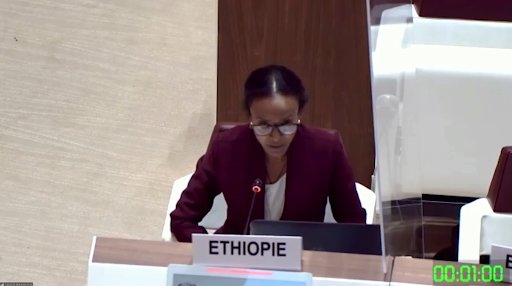 As for Ethiopia, its delegate noted that the country has ratified all the essential human rights instruments on the topic and implemented them into national legislation. The delegate further underlined that living in conflict zones had left many children traumatised and in need of psychosocial assistance. In this context, the representative stressed that the main factor which will lead to containing the suffering of children is respect for the rule of law.
As for Ethiopia, its delegate noted that the country has ratified all the essential human rights instruments on the topic and implemented them into national legislation. The delegate further underlined that living in conflict zones had left many children traumatised and in need of psychosocial assistance. In this context, the representative stressed that the main factor which will lead to containing the suffering of children is respect for the rule of law.
The Chinese delegate welcomed the report of the Special Representative to the Secretary-General on Children in Armed Conflict. The representative stated that all parties should seize the opportunity to resolve conflict through dialogue. China pointed fingers at the US and other countries of waging wars in the name of democracy, which dramatically affects children. The representative noted that children have only suffered since the withdrawal of troops from Afghanistan. Furthermore, China called on the Council to keep a close eye on the issue surrounding Afghan children killed by military members from these countries.
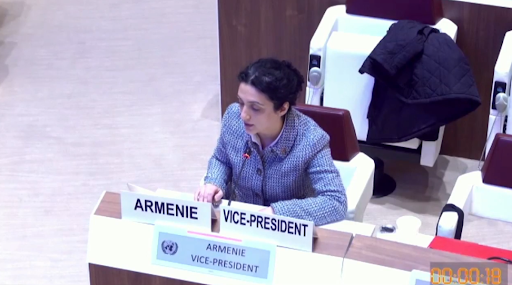 Armenia warmly congratulated the Special Representative for her report and the 25th anniversary of the creation of the mandate of Children in Armed Conflict. The representative noted that as the world is gradually recovering from the pandemic, another humanitarian disaster is unfolding in the region of Nagorno Karabakh. Fifteen months after the cessation of hostilities, Azerbaijan has blown up a gas pipeline in Nagorno Karabakh, imposing unbearable living conditions upon its population. The delegate underlined that children are freezing due to their Armenian ethnic origin. She confronted the Council by denouncing the persistent climate of impunity considering the war crimes committed in the conflict of Nagorno Karabakh, where the first victims were identified as children.
Armenia warmly congratulated the Special Representative for her report and the 25th anniversary of the creation of the mandate of Children in Armed Conflict. The representative noted that as the world is gradually recovering from the pandemic, another humanitarian disaster is unfolding in the region of Nagorno Karabakh. Fifteen months after the cessation of hostilities, Azerbaijan has blown up a gas pipeline in Nagorno Karabakh, imposing unbearable living conditions upon its population. The delegate underlined that children are freezing due to their Armenian ethnic origin. She confronted the Council by denouncing the persistent climate of impunity considering the war crimes committed in the conflict of Nagorno Karabakh, where the first victims were identified as children.
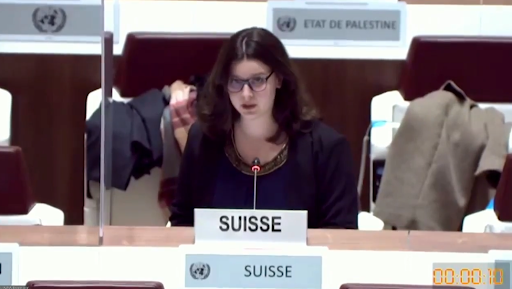 Switzerland also took the floor and aligned itself with the statement made by the European Union. The Swiss delegate asked: "What measures have been adopted to ensure accessibility to data in the field and ensure that the difficulties faced during the pandemic are not repeated?". The representative noted that the number and severity of violations of children's rights are highly alarming. We also see this concerning the war in Ukraine.
Switzerland also took the floor and aligned itself with the statement made by the European Union. The Swiss delegate asked: "What measures have been adopted to ensure accessibility to data in the field and ensure that the difficulties faced during the pandemic are not repeated?". The representative noted that the number and severity of violations of children's rights are highly alarming. We also see this concerning the war in Ukraine.
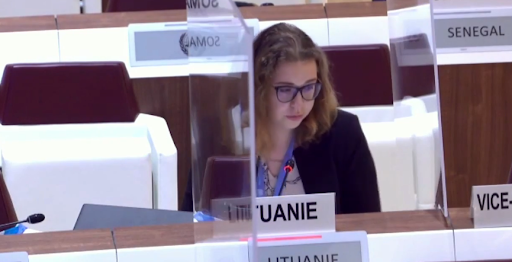 The Lithuanian delegate thanked Ms Gamba for her report and underlined that Russia’s war against Ukraine has a tremendous effect on children. She addressed the situation in the country and demanded that Russia immediately seize its operation in Ukraine. On behalf of Lithuania, she asked: ‘’Madam Gamba, a strong condemnation is not enough; what concrete action could the international community take to protect the life and livelihood of thousands of Ukrainian children?’’
The Lithuanian delegate thanked Ms Gamba for her report and underlined that Russia’s war against Ukraine has a tremendous effect on children. She addressed the situation in the country and demanded that Russia immediately seize its operation in Ukraine. On behalf of Lithuania, she asked: ‘’Madam Gamba, a strong condemnation is not enough; what concrete action could the international community take to protect the life and livelihood of thousands of Ukrainian children?’’
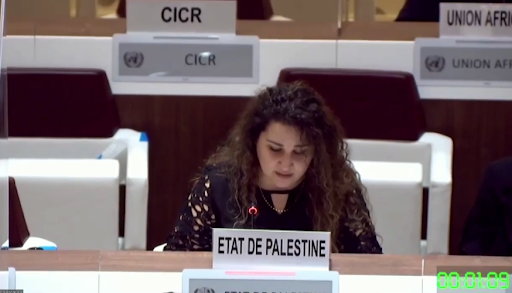 Ms Rana Arrabi, speaking on behalf of the State of Palestine, expressed concern over the lack of action taken to address the suffering of children under occupation. Today, Palestinian children are still at the forefront of the arbitrary measures imposed by the occupying power. The representative voiced concern that children are daily targets, despite being a vulnerable group protected under international laws and norms. She underlined that Israeli attacks were not limited to children. Finally, the delegation asked ‘’What types of measures can be taken to ensure that Israel, as an occupying power, fulfils its obligations under international law and is held accountable in this context?’’
Ms Rana Arrabi, speaking on behalf of the State of Palestine, expressed concern over the lack of action taken to address the suffering of children under occupation. Today, Palestinian children are still at the forefront of the arbitrary measures imposed by the occupying power. The representative voiced concern that children are daily targets, despite being a vulnerable group protected under international laws and norms. She underlined that Israeli attacks were not limited to children. Finally, the delegation asked ‘’What types of measures can be taken to ensure that Israel, as an occupying power, fulfils its obligations under international law and is held accountable in this context?’’
During the discussion, the delegate of the Islamic Republic of Iran exercised its right of reply and insinuated that participating NGOs were representing outside actors. Also, the representative of the Russian Federation, exercising its right of reply, pointed fingers at Ukraine for promulgating lies and denied the accusations of using civilian targets in its aggression on Ukraine.
The Chinese delegate commented that anti-China separatist forces had used the issue of Xinjiang to smear China. The representative firmly rejected the accusations and retorted that those who formulate such facts are anti-China terrorists. He further expressed his discontent by affirming that some representatives of NGOs are not true representatives and accused them of sneaking into the Human Rights Council.
Azerbaijan also made use of its right of reply to respond to the statement of the Republic of Armenia. The delegate accused Armenia of using the Human Rights Council to spread false information.
Finally, the 31st meeting of the 49th Human Rights Council Session was concluded by the Vice-president.
Geneva International Centre for Justice
Geneva International Centre for Justice (GICJ) is deeply concerned about the risk of threats children in armed conflict face, including sexual and gender-based violence and enforced disappearance. Children belong to one of the world's most vulnerable groups and their vulnerabilities are exacerbated in situations of armed conflict. Children are, in many cases, too young to protect themselves and have therefore gained special status under international law and international conventions such as the rights of the child.
However, if the special status we give children, in theory, is not applied in practice, children will continue to face dangerous, deadly and traumatising events, forever impacting them. The situation of children in armed conflict is particularly concerning, as everything taking place in their youth forever shapes them. Traumatising events such as recruitment in armed conflicts or being victims of various types of violence can have a devastating effect on children's mental health and future development.
Geneva International Centre for Justice strongly believes that children's rights should be protected at all costs, especially in armed conflict. Also, children who have participated in armed conflict should be seen as victims instead of being treated like criminals. Effective reinsertion programs should prevail over their endless detention, which further exposes them to sexual exploitation and other types of violence such as rape, forever traumatising them and compromising their future outlook.
We call on countries to redouble their efforts to work to prevent conflicts. Lastly, we emphasise that the mandate's goal will not be reached until all violence against children in armed conflict is ended. The international community must work together to ensure the safety and well-being of children and sanction the perpetrators responsible for human rights violations.
Children in Armed Conflict, Children’s rights, Violation Against Children, Children are Our Future, International Law, International Humanitarian Law, Interactive Dialogue, Human Rights Council, HRC49th Regular Session, Justice, Human Rights, Geneva, Geneva4justice, GICJ, Geneva International Centre for Justice




